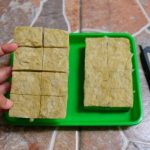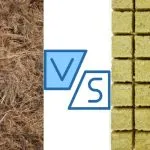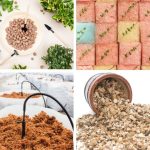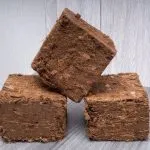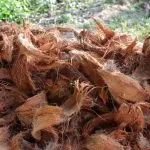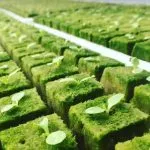When it comes to hydroponic gardening, choosing the right size Rockwool cube is crucial to ensure your plants have the optimal environment for growth. Rockwool cubes, made from long strands of natural fibers, offer excellent moisture retention without drowning the seeds – making them ideal for seed starting and germination. With various sizes available in the market, you may be wondering which size is best for your plants.
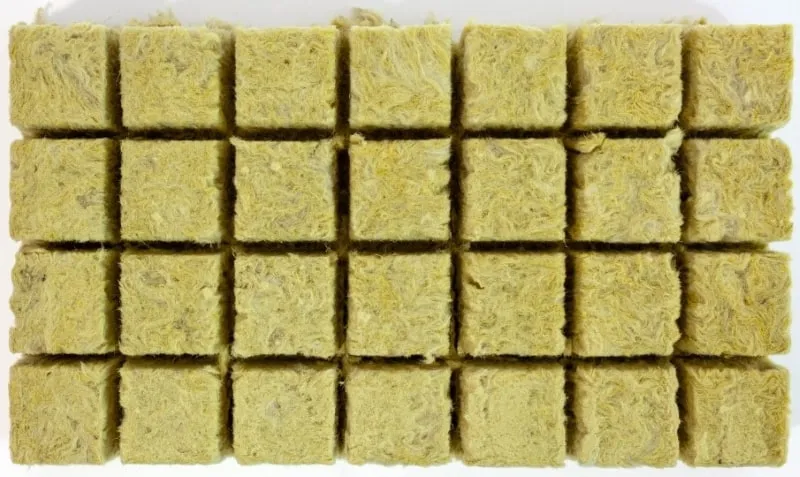
Understanding the different sizes and their applications can help you make informed decisions when selecting Rockwool cubes. Commonly available sizes include 1.5″x1.5″x1.5″, 2″x2″x1.5″, 3″x3″x2.5″, 4″x4″x2.5″, and 6″x6″x5.3″. What size rockwool cubes to use in hydroponics depends on a few factors. Typically, smaller cubes are better suited for seedlings and clones, while larger cubes can support more developed plants during their vegetative and flowering stages.
Now that you have a general idea of the various Rockwool cube sizes, it’s essential to consider factors such as your growing system, the type of plants you’re cultivating, and their maturity stage. This will ensure you select the most appropriate size to provide your plants with the ideal growing conditions for success.
What Are Rockwool Cubes
Rockwool cubes are a popular growing medium made from natural materials, such as basalt rock and chalk. These materials are melted at extremely high temperatures (around 3000°F) to form lava, which is then spun into fibers. The fibers are then compressed to create Rockwool planting cubes.
As an environmentally friendly and versatile grow medium, Rockwool planting cubes offer numerous advantages to gardeners. They are lightweight, easy to work with, and highly absorbent thanks to their porous structure. This allows them to retain both water and nutrients, ensuring that your plants receive everything they need to grow strong and healthy.
Moreover, Rockwool cubes promote proper aeration for plant roots, which is essential for successful growth. They are particularly well-suited for hydroponic systems, where plants are grown without soil, and instead rely on nutrient-rich water to provide their needs.
Originally developed in Denmark, Rockwool is also referred to as stone wool or mineral wool. It’s important to note that rockwool cubes come in various sizes, which are specifically designed to accommodate the different growth stages and requirements of various plant types. As a result, it’s crucial to choose the appropriate size to ensure optimal growth conditions for your plants.
Related: Ready to buy Rockwool for your hydroponic system? Choose from our recommended best Rockwool cubes, blocks, and slabs.
Benefits of Using Rockwool Cubes
Rockwool cubes offer various benefits to your hydroponic gardening efforts, making them an excellent choice for your growing needs. Let’s explore some of the key advantages:
Sterile Environment: Rockwool cubes provide a sterile growing environment for plants, ensuring that they are not exposed to pests or diseases. This cleanliness helps reduce the risk of infection and supports healthy plant development.
Water Retention: One of the standout features of Rockwool cubes is their ability to retain water effectively. This ensures that your plants receive adequate hydration, while also preventing overwatering. As a result, roots remain moist and well-nourished.
Inert Material: Rockwool is an inert growing medium, meaning it doesn’t affect the nutrient balance of your hydroponic system. This allows you to control the nutrients your plants receive without interference from the growing media.
Moisture and Aeration Balance: Rockwool cubes strike an ideal balance between moisture retention and aeration. They hold onto water but also allow excess water to drain and air to circulate. This helps maintain oxygen levels around the roots, enabling healthier and stronger root growth.
Adaptable to Various Plant Types: Rockwool cubes come in different sizes, allowing you to select the most appropriate size for a wide range of plants. This flexibility lets you grow various types of plants within the same hydroponic system using appropriately sized Rockwool cubes.
Insulation Properties: Rockwool’s insulation capabilities can help maintain consistent temperatures within your hydroponic system. This stable environment contributes to the overall well-being of your plants, helping them flourish.
By using Rockwool cubes in your hydroponics setup, you can effectively create a friendly and efficient growing environment for your plants. The benefits of sterility, water retention, inertness, and excellent aeration make Rockwool a top choice for many hydroponic enthusiasts. However, be aware that there are alternatives to Rockwool that you can consider. Learn more about how to use Rockwool for hydroponics.
Choosing the Right Size of Rockwool Cubes
When it comes to hydroponic gardening, selecting the appropriate Rockwool cubes sizes is crucial for your plants’ growth and development. Planting seeds in Rockwool cubes provides an ideal environment for your plants to establish a robust root system while ensuring they receive the necessary nutrients and moisture. In this section, we’ll discuss what size Rockwool cubes are best for clones and tower gardens.
What Size Rockwool Cubes For Clones
When propagating clones, the size of the Rockwool cube plays a significant role in the success of your young plants. Smaller cubes, such as 1.5 inch or 1 inch rockwool cubes, are ideal for seedlings and clones due to their compact size. This allows for easy transplanting and provides your young plants with a suitable environment for establishing strong roots. You can also fit quite a few clones into one aeroponic cloner.
When using smaller Rockwool cubes for clones, follow these guidelines:
- Provide ample spacing between your clones to prevent overcrowding and promote proper growth.
- Monitor the moisture levels of your Rockwool cubes to ensure they are neither too wet nor too dry, helping prevent root rot or drying out.
However, as your clones grow, they may require larger Rockwool cubes to accommodate their expanding root systems. 3 inch rockwool cubes are suitable for pre-vegetative growth stages, while growing in 6 inch rockwool cubes could be necessary for more substantial plants during the vegetative phase.
Related: Can you plant Rockwool cubes in soil if you don’t want to risk damaging the seedling roots by removing them before transplanting? Find out here!
What Size Rockwool Cubes For Tower Garden
A tower garden is a vertical hydroponic system that allows you to grow multiple plants in a limited space. In such a system, determining the correct Rockwool cubes sizes is essential for providing the best conditions for optimal growth.
When planting seedlings in Rockwool cubes for a tower garden:
- Choose larger Rockwool cubes, such as 4-inch or 6-inch sizes, for plants with bigger root systems. This gives them enough space to grow and expand.
- For more compact plants or seedlings, consider using smaller Rockwool cubes, like 1-inch or 2-inch sizes, since they will maintain adequate moisture and provide the necessary support for the initial growth stages.
Remember to adjust your hydroponic system’s nutrient and water delivery to account for the different sizes of Rockwool cubes and ensure all your plants thrive in your tower garden.

